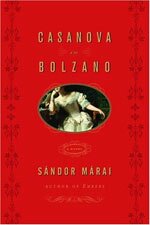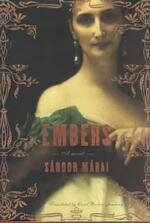Tuesday, August 30, 2005
Monday, August 29, 2005
Tibor Fischer's top 10 eastern European novels
Tibor Fischer, the Hungarian-British novelist who wrote Under the Frog (the title being a reference to the Hungarian saying, "Under the frog's ass," meaning as low as you can possibly get), placed Embers in the #2 spot in his list of the Top 10 Eastern European novels for The Guardian.
Marai moment: Yi Yi
 Readers of Proust refer to "Proustian moments" that take place throughout In Search of Lost Time as these moments when a smell or sight triggers an overwhelming flood of memories. Similarly, a single type of scene recurs throughout all of the Marai works I've read or know of: an encounter between old friends or lovers for the first time in many years.
Readers of Proust refer to "Proustian moments" that take place throughout In Search of Lost Time as these moments when a smell or sight triggers an overwhelming flood of memories. Similarly, a single type of scene recurs throughout all of the Marai works I've read or know of: an encounter between old friends or lovers for the first time in many years.There is just such a "Marai moment" in the Taiwanese film, Yi Yi (there's a number of Kodak moments, as well-- note the cover): a middle-aged father, a family man and salaryman, accidentally runs into an old girlfriend/fiancee from college for the first time in something like 15 years. This excellent film by Edward Yang shares much in common with Marai: the concerns of middle age, the complete candour that can take place between two adults finding themselves in a Marai moment... Good stuff.
Casanova in Bolzano
 The second Marai novel to be published in English by Knopf. If Embers was primarily about friendship, Casanova is primarily about love between man and woman. It is clear that Sandor understands people better than most writers of the twentieth century, or in fact any that come to mind. From his writing, Sandor must have lived-- really lived--
The second Marai novel to be published in English by Knopf. If Embers was primarily about friendship, Casanova is primarily about love between man and woman. It is clear that Sandor understands people better than most writers of the twentieth century, or in fact any that come to mind. From his writing, Sandor must have lived-- really lived-- Casanova is Bolzano is not a young man's (or woman's) book. Its insights are generally for those who've lived a good chunk of life already-- experienced human ambition and disappointment, true love and one night stands, youth and age, celebrity and exile, and grappled with the sometimes conflicting dictates of love and sex. It's a mature work from a mature writer.
It is also not a historical novel; it has precious little to say about the eighteenth century, or Italy, or even specific characters. The characters in Bolzano are not even "characters," as such-- in fact, the name "Casanova" does not appear once, outside of Sandor's introduction (the original Hungarian title is "Vendégjáték Bolzanóban," which also does not mention "Casanova"). It's about people, archetypes.
How does it compare with Embers? It starts off a little more slowly (The NYTimes review called it, "a novel of exquisite slowness and refreshing oddity"), but quickly picks up for one classic Marai scene: two people in a room meeting again for the first time in years.
See The Complete Review: Casanova in Bolzano - a summary of all the reviews and useful links.
Tuesday, August 23, 2005
Embers
 This is the first of the Marai Sandor novels to be published in English by Knopf. It is translated by Carol Brown Janeway, who translated not from the Hungarian but the German edition. This is pretty dubious translation practice, and a review at The Complete Review indignantly called this "literary sin," but the prose reads remarkably well. The sentences are beautifully rendered, and my Hungarian mom, who's read both the original and the English, greatly preferred this translation to the English translation of Marai's Casanova in Bolzano, which was translated straight from the Hungarian by someone else. Oh, well.
This is the first of the Marai Sandor novels to be published in English by Knopf. It is translated by Carol Brown Janeway, who translated not from the Hungarian but the German edition. This is pretty dubious translation practice, and a review at The Complete Review indignantly called this "literary sin," but the prose reads remarkably well. The sentences are beautifully rendered, and my Hungarian mom, who's read both the original and the English, greatly preferred this translation to the English translation of Marai's Casanova in Bolzano, which was translated straight from the Hungarian by someone else. Oh, well.Embers is a masterpiece, and a short one, at that. It can be read in a day or two, which makes it a perfect recommendation to friends (you can't exactly tell someone to read Gravity's Rainbow). The premise of the story is that two old men meet again for the first time in forty years to discuss what ended their friendship so many years ago.
Welcome
This is a blog about the literary works of the great 20th century novelist, Sandor Marai (or Márai Sándor, if you want to include the accent marks and use last name first, as the Hungarians do). His name is pronounced Maa'-ruh-ee Shahn'-door.
Now that Sandor's works are being translated into English, it is clear that he is a major, major writer. Of the stature of Thomas Mann, if not quite Proust. I would like to add as much information as possible so that his English-speaking readers can know more about these fascinating works.
Now that Sandor's works are being translated into English, it is clear that he is a major, major writer. Of the stature of Thomas Mann, if not quite Proust. I would like to add as much information as possible so that his English-speaking readers can know more about these fascinating works.

